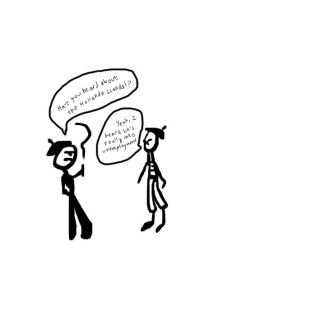By ELIZABETH ZANGHI
STAFF WRITER

François Hollande, the current president of France, is not a typical family man. He has four children with his former partner, Ségolène Royal, whom he never married, and he now has a live-in girlfriend, Valérie Trierweiler, whom the French consider the first lady. This relationship was never really newsworthy, though, until French gossip magazine Closer published that Hollande was having an affair with French actress Julie Gayet. Since then, even the most respected news outlets in France, such as Le Monde and l’Express, have published articles discussing the affair, but not as frequently, or as severely, as their American equivalents.
This disparity should not come as a surprise. In general, the French give their politicians much more privacy. Whereas in America, news of a presidential affair is considered a barometer of the president’s values and ability to govern (as we saw with Bill Clinton). In France, the news is simply considered gossip, and for the most part, it is even accepted. It is said that every French president since Charles de Gaulles in the 19th century had an affair at least once, and the French did not penalize politicians based on their personal lives. Why? For the same reason Americans accept that many NBA stars have affairs: cheating does not make them bad players.
It is not illegal to cheat on your wife. It is certainly not illegal to cheat on your girlfriend. According to the French, that is a good enough reason to grant politicians privacy, especially when considering their love lives, and even when the privacy is breached, the French seem not to care. In fact, according to le Journal du Dimanche, a weekly newspaper in France, Hollande’s approval rating has not changed since news of his affair entered into the news cycle, and a poll from the French Institute of Public Opinion found that 77 percent of French citizens believe Hollande’s affair is a private matter.
It is important to remember that this high percentage is not due to a bias toward the president. Though Hollande’s approval rating remained unchanged, it is still abysmal at a staggering 22 percent, but again, not because of his affair. He is largely unpopular due to his inability to jump-start the economy. According to a December article in le Figaro, a French newspaper resembling the Wall Street Journal, Hollande “continues to say that he will succeed in reversing the trend in unemployment by the end of 2013.” His goal failed, though, according to le Journal du Net, a French economic news source, and unemployment rose by .1 percent to the current 10.5 percent unemployment, compared to the United States’ 6.7 percent unemployment rate at the end of December, according to the Bureau of Labor Statistics.
Keeping these unemployment figures in mind, it is interesting to look at the comparisons many American news sources make between Bill Clinton and Hollande. PolicyMic even calls Hollande “France’s Bill Clinton.” Many French citizens would disagree whole heartedly with this comparison. At the end of December 2000, the last full month of Clinton’s presidency, the unemployment rate was at 3.9 percent. The unemployment rate has not been that low ever since the unemployment rate has not been that low since. Yet, Clinton became one of only two presidents to be impeached by the House of Representitives solely based on the Monica Lewinsky scandal. The French, as evidenced by more than a century of laissez-faire attitudes towards politicians’ private lives, would never handle a sexual affair by compromising the politician’s ability to govern.
Americans should learn from the French. We should not be judging politicians based on their private lives.
Some may argue that since politicians are in the spotlight, they should be exemplary role models for the younger generations. But why? We should leave the role modeling to parents and family members, the people who are closest to the country’s most pliable minds. If we do not want our youth to be influenced by politician’s faulty behaviors, there is a simple solution: less headlines about sex, and more about solutions.
We should make kids more excited to talk about a president’s governing style than a president’s lifestyle choices or private life. We ought to be like the French and decide we hate a president because he is a bad president, not because he is a bad boyfriend.
Elizabeth Zanghi, FCRH ’15, is an art history major from Lancaster, Pa., now studying in Paris.








































































































































































































